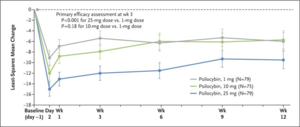Psilocybin
The active psychedelic ingredient (when converted to psilocin) found within magic mushrooms. Psilocybin has been found to be an effective cure of treatment resistant depression.
Psilocybin degrades quickly into its active metabolite psilocin after ingestion. Both psilocin and psilocybin exhibit affinity for a range of serotonin receptors (5-HT1A/B/D/E, 2B, 5, 6, 7) with high affinity for the 5-HT2A receptor.
Depression Dosage
The dose to cure depression has seen a dose dependency 25mg is a better dose than lower doses such 10mg or microdosing[1]. This equates to 10–20µg l–1 psilocin in plasma, which corresponds to ~60% occupancy of serotonin 2A (5-HT2A) receptors in the neocortex of humans.[2] Psychological effects start around 10–40 min after ingestion and last for 2–6 h.
Reference
- ↑ Single-Dose Psilocybin for a Treatment-Resistant Episode of Major Depression. Guy M. Goodwin. First published November 3, 2022. N Engl J Med 2022; 387:1637-1648. DOI: 10.1056/NEJMoa2206443. Accessed on 5th November via https://www.nejm.org/doi/full/10.1056/NEJMoa2206443
- ↑ Psychedelic effects of psilocybin correlate with serotonin 2A receptor occupancy and plasma psilocin levels. MK Madsen Neuropsychopharmacology, first published 2019. Accessed on 5th November 2022 via https://www.nature.com/articles/s41386-019-0324-9
